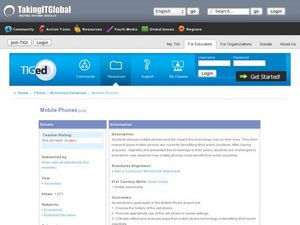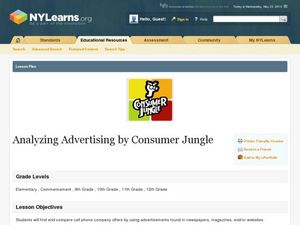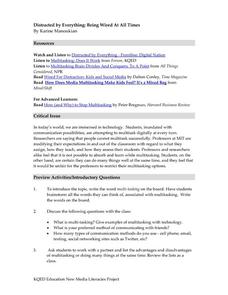Curated OER
Mobile Phones
Mobile phones and how they are used is the focus of this sociology lesson. In it, middle and high schoolers explore how they use mobile phones. They create and act out conversations, text messages, and take a close look at how texting is...
Curated OER
Analyzing Advertising
Some ads really make products look great, and even better than they really are! Kids get into small groups to research and compare marketing used by various cell phone companies. They analyze advertisements, carrier options, and cell...
Film English
iDiots
Mobile phones have become an integral part of many people's lives. Examine the role and impact of technology through a short video and related activities. Pupils share what they use their phones for before viewing the film. Class members...
Bonneville
Phone Charger Efficiency
Be efficient in learning about efficiency. A fun hands-on activity has pupils calculate the efficiency of cell phone chargers by measuring the power in and power out. They also learn how to read and use circuit diagrams.
Health Smart Virginia
Be Smart with Smartphones (and Screens)
Would you rather have a broken phone or a broken bone? This very engaging question launches a discussion about the smart use of smartphones and screens. Young scholars watch a series of videos, complete worksheets, and engage in...
iCivics
Why Do We Have a House and Senate, Anyway?
Why does the United States have a bicameral voting system? Through role playing as either advocates for or against a cell phone policy in school, your learners will organize, vote, compromise, and experience first-hand the benefits of a...
Agriculture in the Classroom
Understanding the Columbian Exchange Through Old World and New World Foods
If you're interested in teaching your class about the impact of the Columbian Exchange on contemporary society, this is worth a look. The plan begins with an introduction to the topic, which stems from a cell phone poll...
Middle Tennessee State University
The Invention of the Telephone
All of the people in your class would agree that life would be different without the invention of the telephone! Study Alexander Graham Bell's most famous and influential invention through the primary source document of his sketch of the...
NPR
Distracted by Everything - Being Wired at All Times
This multimedia activity challenges media-savvy learners to look at the critical issue concerning the inundation of technology and multitasking in the classroom, and its effects on the education of themselves and others. The tasks...
California Department of Public Health
Walking on the Path to Better Health
Walk your way to health with this great resource! Walking is a valuable physical activity that can be done frequently and with ease by learners of all ages. "Warm up" by reviewing the benefits of physical activity with your class and...
Learning to Give
It's Never Too Late: Air Quality
What are the causes and effects of pollutants on the quality of the air we breathe? Groups research emission standards, emission controls, career opportunities in the area of air quality control, and things government and individuals can...
Federal Reserve Bank
To Rent-to-Own or Not to Rent-to-Own?
Explore the key elements of a contract with your young adults, and delve into the features and unique benefits of a rent-to-own contract through discussion and worksheet practice.
Science 4 Inquiry
All the Small Things
Scholars use sorting cards to try to define a pure substance versus a mixture. Risk becomes reward as they observe the differences and create a flowchart sorting matter into mixtures and pure substances (elements and compounds).
Other popular searches
- Cell Phones
- Cell Phone Technology
- Cell Phone Use
- Mobile Phones
- Cell Phones Texting
- Internet Cell Phone
- Cell Phones in School
- Cell Phone Etiquette
- Cell Phones and Driving
- Contracts for Cell Phones
- Cell Phones Lesson Plans
- Cell Phones Reading














